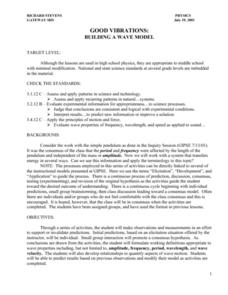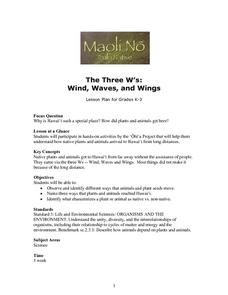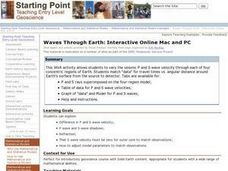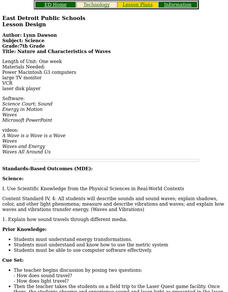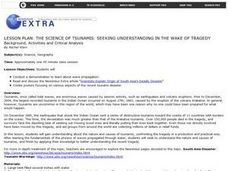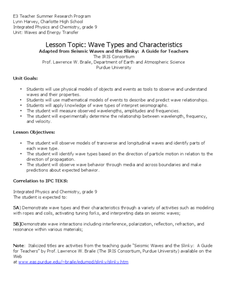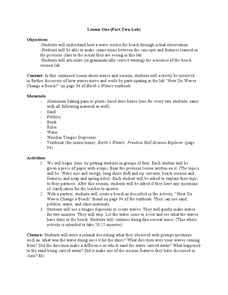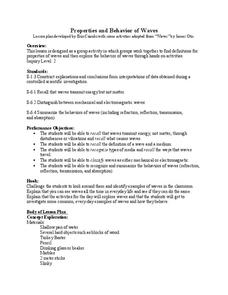Curated OER
Weather
For this weather worksheet, students write the letter of the definition that best matches the term or phrase. Students answer several short answer questions as it relates to the components of weather, severe weather, and air masses....
Curated OER
Waves Worksheet #2
For this waves worksheet, students complete 7 fill in the blank questions regarding frequency, speed, amplitude and wavelength and how these properties relate to each other.
Curated OER
Ocean Water and Life
For this ocean water and life worksheet, students match the vocabulary term with the correct definition. Also, students answer questions by deciding if the statements are true or false. Finally, students complete concepts maps while...
Curated OER
Energy and Waves
In this energy and waves worksheet, students will complete a Venn Diagram comparing what makes energy and waves different and what they have that are the same.
Curated OER
Waves and Wave Properties
In this science learning exercise, high schoolers find the words that describe the properties of waves and the answers are found by clicking the link at the bottom of the page.
Curated OER
Beach Profiling
Students explore waves, winds and their effect upon the shape of the beach. They participate in hands-on observations and take measurements along the beach to create a profile of its appearance. Students record their observations, create...
Curated OER
Good Vibrations: Building a Wave Model
Students assess and apply recurring patterns in natural systems. They evaluate the wave properties of frequency, wavelength, and speed as applied to sound. Students develop a relationship to quantify aspects of wave motion. They predict...
Curated OER
Wave Properties
Students identify how waves transfer energy without transferring matter. They contrast transverse and compressional waves and relate wave speed, wavelength, amplitude and frequency. Lesson includes PowerPoint presentation.
Curated OER
The Three W's: Wind, Waves, and Wings
Students participate in hands-on acticities to understand how native plants and animals arrived on Hawaii from long distances without the assistance of man. They then identify what characterizes a plant or animal as native vs. non-native.
Curated OER
Waves Through Earth: Interactive Online Mac and PC
Students participate in a JAVA activity to vary the seismic P and S wave velocity through each of four concentric regions of Earth. They match "data" for travel times vs. angular distance around Earth's surface from the source to detector.
Curated OER
Tuned in: Tuning Forks and Sine waves
Students explore the characteristics of a pure sound wave produced by a tuning fork. They use sine waves to find a curve to fit the sound wave data produced by the tuning fork. A CBL and microphone is required for this activity.
Curated OER
Wave Erosion Lesson
Fourth graders examine the effects of waves as they erode coastal land. They discover how the power of water can change the appearance of land formations.
Curated OER
Properties of Waves
Third graders observe and investigate wave properties and compare the properties of particles and waves. They fill a pie pan half full with water, place a toothpick in the center of the pie pan, then drop a marble into the pan and...
Curated OER
Nature and Characteristics of Waves
Seventh graders research different types of waves, identify the parts of a wave and create a Power Point presentation demonstrating what they have learned.
Curated OER
Electric Circuits
Students model the flow of electrons in a circuit, draw diagrams of an electric circuit and build an electric circuit. Students explain how to tell when the path of an electric circuit is complete, and test the conductivity of a variety...
Curated OER
Wonderful Waves - Wave Model
Students demonstrate that simple models can be used to represent real world objects that are not easily brought into a classroom. They create a wave model using two different types of simple models.
Curated OER
The Science of Tsunamis: Seeking Understanding in the Wake of Tragedy
Students use Internet research, articles, discussion and models to explore the dynamics of a tsunami. They focus on the 2004 Asian Tsunami and create posters illustrating their understanding of this phenomenon.
Curated OER
Make Waves
Sixth graders discover, through exploration, the basic characteristics of waves. After a lecture/demo, 6th graders work in groups and participate in a series of labs where they investigate waves. Each group presents its findings to the...
Curated OER
Wave Types and Characteristics
Ninth graders identify the different parts of a wave. For this physics lesson, 9th graders observe wave behavior as it travels through a boundary. They determine the relationship between wavelength, frequency and velocity.
Curated OER
How Do Waves Change a Beach?
Students conduct an experiment on beach erosion. For this earth science lesson, students create a beach model and use tongue depressor to produce waves. They write a journal about their observations.
Curated OER
Properties and Behavior of Waves
High schoolers explore the different properties of waves. In this physics lesson, students differentiate mechanical and electromagnetic waves. They explore each lab station and write their observation about the wave behavior they see.
Curated OER
Polarization
Eighth graders study the basic facts of polarization. In this light waves lesson students demonstrate some activities illustrating interference patterns.
Curated OER
Ocean Shoreline
In this shorelines activity, learners review some of the features of an ocean shoreline such as barrier islands, longshore current, and shoreline sediments. This activity has 5 matching and 4 short answer questions.
Curated OER
The Third Location and Millennium Wall Exercise
In this third location and millennium wall exercise worksheet, students sketch the fossil in a given diagram. Students use their imagination to sketch what the animal may have looked when it was alive.








